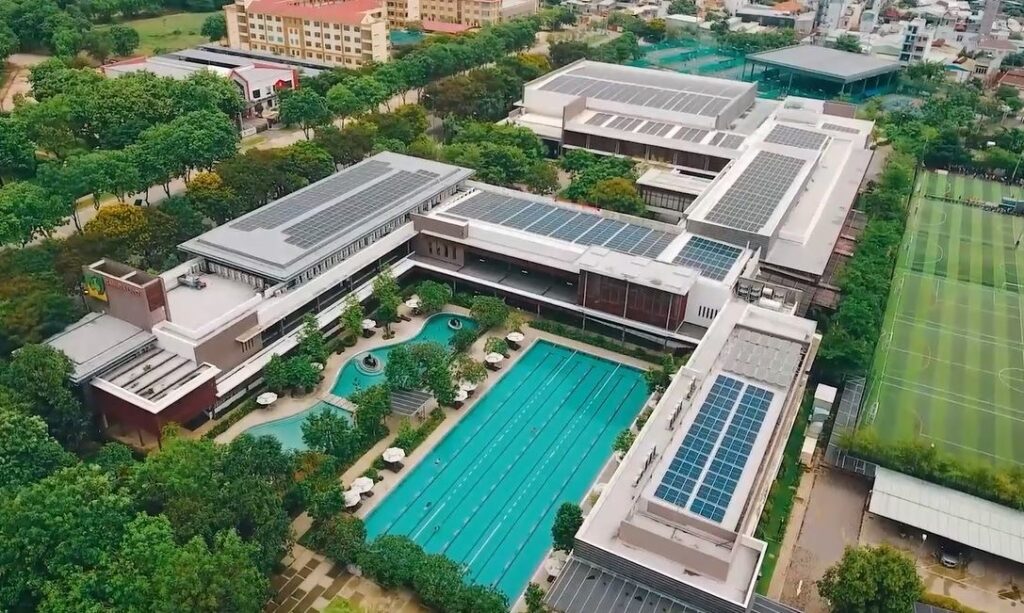Freepik.com
Yuevern Loh
As the Group takes big strides towards achieving goals set in the Gamuda Green Plan, the team at Gamuda Land Vietnam took a step closer in realising initiative by introducing the first solar energy operated sports complex in Ho Chi Minh City (HCMC).
The Celadon Sports and Resort Club (CSRC) in Celadon City officially kicked off the solar power system operations in March this year. This is part of their efforts to fulfill the pledge of conducting businesses sustainably by tackling climate change and establishing limits to carbon emissions. It also lives up to Gamuda Land’s brand value of “Respecting Nature and the Environment”.
With abundant sunlight in Vietnam, especially the southern region, paired with major technological breakthroughs in recent years, solar energy is becoming more and more viable as its cost-effectiveness increases. And to top it off, the Vietnamese government introduced a feed-in-tariff for solar energy to encourage energy transition in 2017, thus enabling the realisation of this socially responsible project.
There are 1,677 photo-voltaic (PV) panels covering 4,800 m² of the roof at CSRC. The entire system was installed by Indefol, a solar developer using world-leading energy technologies. Indefol also invests in the technology, equipment and maintenance of the system at Celadon City.
The system’s average electricity output is 2,800 kWh per day, equivalent to 84,000 kWh per month during peak summer months. Every kW powered by this low carbon energy is 15% cheaper than the city electricity tariff.
Aside from the tangible benefit of saving operational costs, this action is seen as the pilot step towards greening the power system. The team is inspired by Bill Gates’ latest book “How to Avoid a Climate Disaster” to tackle climate change with low-carbon electricity, which is the key to decarbonise other economic activities.
The collaboration with Indefol and other solar power generation experts also provides an opportunity for the team to learn from and gain knowledge on the operation of solar power systems. This invaluable technical know-how will be a foundation to deploy future renewable energy initiatives in other Gamuda Land townships.


The rooftop of Celadon Sports and Resort Club (CSRC) is covered by PV panels
But of course, tackling such a big project comes with its set of challenges. We all know solar energy highly depends on the availability of sunlight to gather solar energy effectively. There are already technologies in the market to store the energy in large batteries to cover intermittency, but they come with a large capital cost.
Currently, only about 40% of the power consumption is off the grid but the team is staying vigilant on new technological breakthroughs that can improve the current system’s efficiency.
“We firmly believe that there will be significant technological advancements for energy conversion efficiency in the near future. We still have room to put 60% of our power consumption off the fossil-fueled electricity grid,” says Jane Luu, Commercial Real Estate Manager of Gamuda Land HCMC.
Another challenge the team faces is the system needing a relatively large installation area to provide electricity consistently. This is mainly because most of the PV panels can convert only a quarter of the direct sunlight into solar energy. Therefore, the technological bottleneck hinders the team from installing solar power in a bigger scale for all the apartments in the township.


The team at Gamuda Land Vietnam is proud to have a few more initiatives in the pipeline to green their power system further. Aside from adopting the solar system for future projects, they are also working on installing Electrical Vehicle (EV) charging stations within the township and renewable energy installation for the sewerage treatment plants and other public facilities within the township.
“We are happy that the system is under operation, and it marks the first step of our journey in applying sustainable energy solution for our township, Celadon City. This kicks off our goal towards achieving a 40% reduction in non-renewable energy use by 2030 in line with the Group’s ESG aspiration,” says Angus Liew, General Director of Gamuda Land HCMC.
